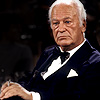No, Canby still liked giving hatchet jobs. But he occasionally took a break to praise bad movies.
And good ones, as his MR review demonstrates.
He was consistent in his perversity. I'll restore sanity to the thread with Pauline Kael's MR review:
I'll trump you with Jay Scott's review "007 in space as good as ever". Scott was an intellectual and art film fancier, don't you know.
THE BOND by which to compare all other Bonds is Goldfinger and by that standard Moonraker is second-best. But, by the standards of most of the other candy served up as summer fare, Moonraker is marzipan - it's so insubstantial it melts in your mouth, but its flavor is distinctive and you can't get enough of it. This movie is going to hit like Muhammad Ali.
Moonraker in the first few minutes before the credits offers more thrills than most escapist movies provide in two hours. A space shuttle is hijacked, a jumbo jet explodes and James Bond (Roger Moore) and two of the villains plummet to earth, fighting over a parachute. By the time Shirley Bassey flexes her leather lungs and exhales the Moonraker theme song (fourth best, surpassed by Goldfinger, Paul McCartney's Live and Let Die, and Carly Simon's The Spy Who Loved Me), the excitement has gone all the way up to giddy. And never comes down.
Drax (Michael Lonsdale), the smoothest Bond nasty yet - a witty Howard Hughes and William Randolph Hearst hybrid but with better taste in furnishings than either - feeds filets to his Dobermans and orders his butler to Look after Mr. Bond. See that some harm comes to him. Mr. Bond will find himself in harm's way in L.A., in Venice (there is an amphibious gondola that is one of the funniest machines ever made) and in Rio, where we go to Carnival and where the suave satyr saves Dr. Holly Goodhead (Lois Chiles).
Like Rocky, the Bond formula is a bonanza, and there's no fighting it - why would any one want to fight a good time? Ken Adam's production designs are spectacular enough on earth, but in outer space, where Moonraker climaxes with a war between NASA and the forces of Drax, they are high-tech Piranesi. The script by Christopher Wood pops off some vintage one-liners. (Bond, asked about his association with a CIA agent, says, I have some friends in low places.) There is even a sweet, campy lampoon of Frankenstein. And as a travel movie, Moonraker is first-rate: when you go to Rio, you won't have to bother with the cable cars and when you go to Venice, you won't have to bother with the glass factories - you've already been there.
Moore is getting a little long in the tooth but his aging has had an unpredictable effect on Bond: this older, wrinkled agent acting like a man half his age is unexpectedly affectionate and cute. Cuddly. When one of the Bond beauties announces that she has laid in a case of Bollinger champagne for him and he quips, If it's '69, you were expecting me, the line is not nearly as salacious - and it's much funnier - than it would have been coming from the smooth-faced Moore of some years ago.
To Drax, James Bond appears with the tedious inevitability of an unloved season. To the rest of us, he's like summer: the inevitability of his arrival is one of the few pleasurable certainties we have been granted.







